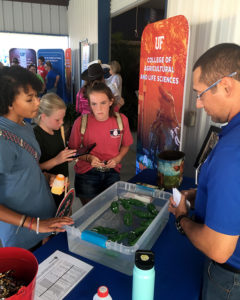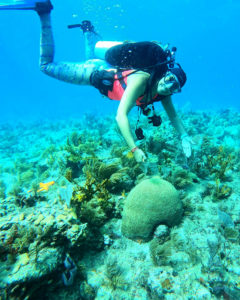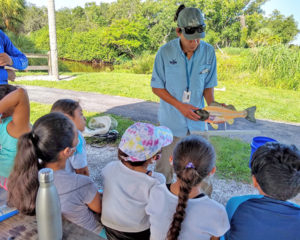During Hispanic Heritage Month, we celebrate and honor the contributions and achievements of our Hispanic UF/IFAS Extension marine agents, who are championing efforts to protect and enhance Florida’s vital marine resources, as well as innovating new inclusion-minded solutions and local insight to meet the challenges of Hispanic communities of Florida.

Victor Blanco, Florida Sea Grant UF/IFAS Extension agent with Taylor County, giving a lesson on conservation during the 40th Annual Sunbelt Ag Expo in Moultrie, GA.
Since 2017, Victor Blanco, a native of Venezuela, has been Taylor County’s Florida Sea Grant agent with UF/IFAS Extension. He is developing educational programs that inform residents and visitors about the sustainable use of natural resources and that support local fisheries stakeholders. These programs cover topics including artificial reefs, sustainable scalloping, and water quality. Most recently, he worked with Florida Fish and Wildlife Conservation Commission (FWC) to translate a widely-shared Fisheries Regulation chart to Spanish. Language inclusion for the Spanish community is an important goal of Blanco’s programming. He is part of the leadership team for Florida Sea Grant’s Bite-sized Science educational webinar series and collaborates with fellow Sea Grant agents to provide coastal and marine topics in Spanish.
“I see that youth of numerous Hispanic families are lacking the use of our language, which is the most precious treasure of our culture,” says Blanco, who is a member of the Café Latino group in UF/IFAS Extension. The goal of their coalition is to reach the underrepresented and the underserved communities of Florida.
Victor’s translations do not stop at ocean conservation; during the height of the COVID-19 pandemic, he worked to translate multiple materials and resources to reach Hispanic communities about the coronavirus disease.
Mentoring Hispanic high school and undergraduate students is yet another way Victor lends his voice to today’s Hispanic experience. He guides and inspires mentees through his personal experiences, noting passion for the ocean as his main source of motivation when faced with adversity. His advice to youth? “Get involved and participate, be a volunteer, help other people’s effort in ocean conservation, but above all, be a better ocean citizen.”

Ana Zangroniz discovering grooved brain coral while leading a stony coral tissue loss disease in-water training. Photo by Ella Castellon.
Ana Zangroniz, Florida Sea Grant UF/IFAS Extension agent in Miami-Dade County since 2017, is another fierce “community connector” who appreciates the inclusion made possible in her work by communicating through multiple languages. “The more languages you know, the more people you know,” she says. As a Cuban-American, she appreciates developing educational programs with a focus on Spanish-speaking residents, which comprise more than 60 percent of her county’s population. She feels fortunate to be a part of the larger movement of justice, equity, diversity and inclusion within the marine science and conservation field, hoping to see the broadening of cultural competency in the future of ocean conservation.
Most recently, Zangroniz is providing educational programming, resources and diver identification training as part of response efforts underway to combat the stony coral tissue loss disease affecting the Florida Reef Tract. This year, Zangroniz was also honored by Biscayne National Park with the Southeast Region’s George and Helen Hartzog Award for Enduring Volunteer Service. A dedicated volunteer since 2014, Ana has taken on a role of a leader and a role model for volunteer conservation efforts at the park. She is also the only female volunteer on the Biscayne Dive Team. Advocating for more young women to get involved in ocean conservation, she says, “Push yourself out of your comfort zones, think through what makes you unique, and ask hard questions.”

Armando Ubeda, UF/IFAS Extension Florida Sea Grant Agent of Sarasota County, shares knowledge about fish biology with young students. Photo by UF/IFAS Extension Sarasota County.
Armando Ubeda, a native of Nicaragua, has worked for Florida Sea Grant since 2016 as the UF/IFAS Extension agent in Sarasota County. His programs primarily emphasize the enhancement of water quality and quantity in his county, although his portfolio of educational programs spans topics of sustainable fishing practices, marine debris, citizen science initiatives such as Water Watch, and estuary conservation. He has taken part in multiple conservation management projects that span across multiple Latin American countries such as Nicaragua, Costa Rica, and Belize. He brings his heritage to work by offering educational programs in Spanish, translating and creating resources and materials in Spanish, and setting a high standard for diversity and inclusion in his community.
“I hope to see more women, people of color, and Hispanic people involved in marine science,” he says. “With more minorities involved, the greater the outreach for communities.” Armando directs a lot of his focus towards youth; he leads educational and outreach youth programs on marine debris issues, and motivates the next generational of leaders toward career opportunities in ocean conservation and STEM-focused fields. His take: “Aim high, don’t get discouraged, volunteer, and follow your passion.”
Florida Sea Grant is only succeeding when it is growing and learning to do better. We are fortunate to have a team that looks within itself to uphold program efforts of expanding programming and reaching a broader audience. Through their heritage, Victor, Ana, and Armando are three leaders setting an example to make coastal Florida a better place every day.

![three-sea-grant-agents-bringing-inclusion-to-conservation-[1200×628]-web headshot of victor blanco, armando ubeda and ana zangroniz (left to right)](https://archive.flseagrant.org/wp-content/uploads/three-sea-grant-agents-bringing-inclusion-to-conservation-1200x628-web-1200x600.png)


